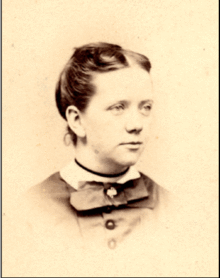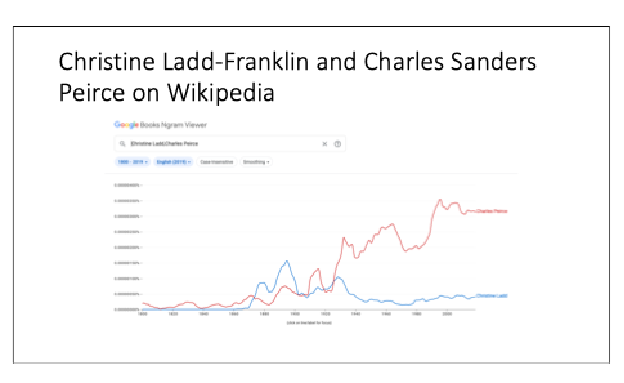Christine Ladd-Franklin (1891–1990): Building Bridges between Philosophy and Sciences Across Continents
The goal of our research project on the American psychologists, logician, and mathematician Christine Ladd-Franklin (1847-1930) is two-fold: On the one hand, we agree with other others (Russinoff 1999; Janssen-Lauret 2021; Abeles 2023) that after initially receiving recognition, little attention was paid to Ladd-Franklin’s important contribution to symbolic logic, the antilogism, in the second half of the 20th century. We agree that Ladd-Franklin suffered a fate in the academy that was far from singular: her case is in fact a striking example of how subtle power dynamics work in academic institutional practice and historiography. On the other hand, we also try to give Ladd-Franklin her voice back by means of a detailed historiographical account of the impact of her contributions to symbolic logic. While her work was commonly either neglected, or praised as the “solution to a problem first raised by Aristotle which had baffled logicians for two thousand years” (Russinoff 1999), our project tries to make a contribution to recent attempts (Uckelman 2021) of providing a more realistic assessment. Our project hence approache the question Uckelman raised of what problem Ladd-Franklin’s famous ‘antilogism’ really tried to solve, by analyzing the changes in notation she suggested in the antilogism and comparing them to the solutions contemporary algebras of logic proposed.

WHO was Christine Ladd-Franklin
While active in many disciplines and areas, especially Ladd-Franklin’s work on color vision and her early contributions to symbolic logic—our primary focus—are worth noting. After undergraduate studies at Vassar, she was accepted as a graduate student at Johns Hopkins University in 1878 with the support of James Sylvester, namely under the name “C. Ladd”, which obscured the fact that she was a woman. Yet, she was ultimately denied the PhD in 1883 by Johns Hopkins—despite being the first woman to fulfill all requirements. (She would only be granted the degree in 1926.) As a consequence, she endured a long period of temporary teaching appointments (at Columbia, Chicago, and eventually she returned to Johns Hopkins).
Nonetheless, the idea of the “antilogism” in “On the Algebra of Logic”(1883) made an impression during her lifetime, as evidenced by the fact that we can find it discussed in all major logic textbooks (e.g., Lewis 1918; Mace 1934; Ushenko 1936). In brief, the antilogism provided a reduction of all forms of valid syllogisms to one, namely in the form of an inconsistent triad. The fundamental relation of Ladd-Franklin’s algebra of logic is exclusion, instead of inclusion. This innovation in notation allowed her to express every valid syllogism by means of the same formula.
Later work largely focused on psychology and the theory of color vision, such as in her Colour and Colour Theories (1929), including in Helmholtz’ laboratory. She died in 1930.
WHY we are interested in Ladd-Franklin
Christine Ladd-Franklin’s “antilogism” for testing syllogistic arguments has recently provoked some discussion among commentators. In our research project, we try to argue that the recent reception of her antilogism paradigmatically reflects the question of how to better integrate women’s contributions into logic, from both a historical and systematic point of view.
In contrast to some recent suggestions that Ladd-Franklin provide the “syllogism’s final solution”, and hence solved a problem that no one since Aristotle could solve, our goal is still to provide a historically rooted reconstruction of the actual contribution Ladd-Franklin made to the debate, how it differs from other accounts of algebra of logic, such as in Boole, DeMorgan, and Schröder.
Although Ladd-Franklin was institutionally marginalized during her lifetime, as the diagram below from the Google Books Ngram Viewer shows, her work still had more of an impact than that of her collaborator and earlier teacher Charles Sanders Peirce. This changed however, after both died. Peirce is today known as one of the most preeminent logicians of his time, and as the “father of pragmatism”, while Christine Ladd-Franklin’s work mostly sank into obscurity.

Talks
Andrea Reichenberger und Jasmin Özel:
“Bridging the Gender Gap on Wikipedia – Perspectives from Teaching Practices in Philosophy of Mathematics”., University of Graz, Conference on “Making women and other underrepresented groups visible in philosophy and history of science”, March 7-8, 2023.
Jasmin Özel
“From the Antilogism to Algebraic Semantics”, Keynote Talk at 1st South American Logic Meeting, Cuspo, Peru, September 12-15, 2024.
“Christine Ladd-Franklin’s Antilogism Revisited ”. 2nd Pan-American Symposium on the History of Logic, University of California, Los Angeles, June 20-23.
“Christine Ladd-Franklin’s Antilogism Revisited.”. ASL (American Society for Symbolic Logic) North American Annual Meeting. University of California, Irvine. March 25-29
"Christine Ladd-Franklin’s Antilogism and the Square of Opposition" at Urteile der Logik - Logik der Urteile at Universität Hagen, Germany. September 29, 2023.
“Christine Ladd-Franklin as a Precursor to Incompatibility Semantics“, University of Hagen, World Logik Day, January 14, 2022.
Papers
Andrea Reichenberger
Reichenberger, A. (forthcoming), “Gender Equality and Diversity. Challenges and Perspectives for the Historiography of Science.
Jasmin Özel
“Christine Ladd-Franklin as a Precursor to Incompatibility Semantics“, [will be submitted to History and Philosophy of Logic]
Cited Works
Abeles, Francine. 2023. “Christine Ladd-Franklin’s Antilogism.” In Aristotle’s Syllogism and the Creation of Modern Logic, edited by L. Verburgt and M. Cosci. Bloomsbury. https://www.bloomsbury.com/us/aristotles-syllogism-and-the-creation-of-modern-logic-9781350228856/.
Janssen-Lauret, Frederique. 2021. “Grandmothers of Analytic Philosophy: The Formal and Philosophical Logic of Christine Ladd-Franklin and Constance Jones.” In Minnesota Studies in Philosophy of Science. University of Minnesota Press. https://research.manchester.ac.uk/en/publications/grandmothers-of-analytic-philosophy-the-formal-and-philosophical-.
Lewis, Clarence Irving. 1918. A Survey of Symbolic Logic. Berkeley University of California Press. http://archive.org/details/asurveyofsymboli00lewiuoft.
Mace, C. A. 1934. “The Principles of Logic.” 1934. https://philpapers.org/rec/MACTPO-122.
Russinoff, I. Susan. 1999. “The Syllogism’s Final Solution.” The Bulletin of Symbolic Logic 5 (4): 451–69. https://doi.org/10.2307/421118.
Uckelman, Sara L. 2021. “What Problem Did Ladd-Franklin (Think She) Solve(d)?” Notre Dame Journal of Formal Logic 62 (3). https://doi.org/10.1215/00294527-2021-0026.
Ushenko, A. P. 1936. THE THEORY OF LOGIC An Introductory Text. Harper and Brothers. https://www.amazon.com/THEORY-LOGIC-Introductory-Text/dp/B000P1JQ0O.
